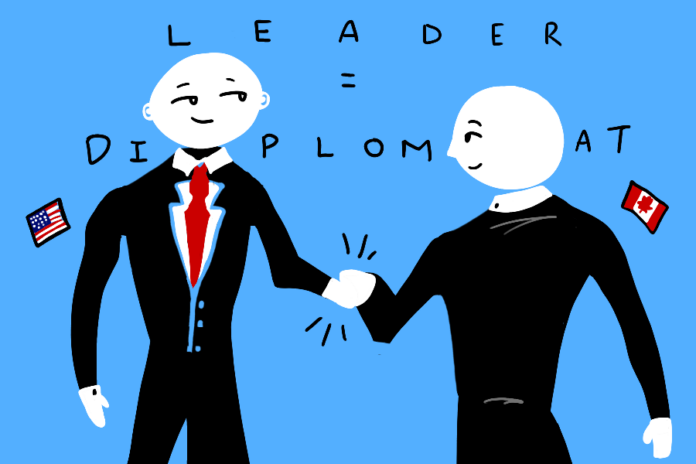Why diplomacy is an invaluable skill
By MAYA KORNYEYEVA — mkornyeyeva@ucdavis.edu
Over the course of our lives, we typically learn to associate the idea of “being diplomatic” with universally moral concepts like fairness, reciprocity and respect. Our parents teach us to behave courteously with our friends and siblings, our coaches encourage us to be good sports with the opposing team and our bosses instill in us the importance of being tactful and sensitive when approaching a business opportunity with another company. The notion of diplomacy exists far beyond the sphere of political discourse, subtly ingrained within our everyday communication.
However, more often than not, we hear the word “diplomacy” emphasized within the realm of international politics, where it is celebrated for its potential to be a powerful tool when utilized appropriately. At its core, diplomatic communication is a strategic exchange of views that can be used to connect with global leaders, negotiate interests and form genuine compromises that ensure both economic and social peace. It is both an art and a science — a skill that demands character, finesse and patience.
In our modern political climate, the art of being diplomatic is actively being forgotten, or, rather, purposefully pushed to the sidelines. Many of our country’s conservative elected officials solely look out for their particular self-interests, at the expense of everyone else: prioritizing “winning” over “collaborating.” Our current president is no exception.
In almost every area of foreign affairs, President Donald Trump is tearing down complex and hard-won webs of connections with global leaders, from Canada to Mexico, Greenland to China and Ukraine to Europe. It seems as though he is altogether incapable of patient, polite conversation and incompatible with the notion of treating other leaders with kindness and respect (unless, of course, there is some potential for personal gain).
Trump and J.D. Vance’s in-person conference last month with Ukrainian president Volodymyr Zelenskyy is a shockingly clear example of the current Trump administration’s lack of diplomacy. In a meeting that was supposed to result in the signing of a rare earth mineral deal between Ukraine and the United States, Trump opened with a sarcastic comment on Zelenskyy’s attire (plain military clothing, rather than a suit), Vance accused Zelensky of not being “grateful enough” for U.S. military aid and their conversation ended with both the president and vice president shouting down Zelensky and berating him for “gambling with World War III.”
Their behavior broke all bounds of decency and demonstrated unfounded contempt for another world leader, resulting in irreversible damage to diplomatic ties with Ukraine. Notably, Ukraine-U.S. relations were progressing smoothly up until Trump’s appointment to office; Both countries were in agreement to protect a Ukrainian democracy and condemn Russia for its crimes. In a conversation that lasted just under an hour, Trump and Vance managed to show the world how disrespectful they could truly be, cementing the views of other global leaders that America may no longer be a reliable and friendly ally.
Beyond this widely televised exchange, Trump’s rapid installation of tariffs on foreign imports — pertaining to nearly all of America’s trading partners — is evidence of his disregard for keeping the peace with other nations, sending a spark capable of fueling the fire of a global trade war. Furthermore, his clear disrespect for the sovereignty of other independent countries brings America back centuries, to a time when our nation was eagerly seeking to conquer and colonize. In recent weeks, Trump referred to Canada’s former prime minister, Justin Trudeau, as a “governor” and the country as America’s “51st state.” He has also vowed to annex Greenland, a Danish territory, “100 percent,” “one way or another,” citing national security as a reason for this bizarre move.
This is not to say that keeping our national interest at the forefront of our political agenda is not fundamental. However, if the means to achieve this end bypass respectful negotiations, attack other leaders and destroy connections formed over decades of diplomatic communication, it creates lasting harm and uncertainty. In turning away previous American allies, withdrawing U.S. Agency for International Development from vulnerable countries and taxing foreign imports with little to no negotiation process, Trump is isolating America from other democratic nations and building dangerous bonds with authoritarian nations like Russia and North Korea.
We need the diplomatic leader back: someone who understands the intricacies of polite and courteous communication, who is able to forge stronger ties with our existing allies and engage in fair negotiation — not an administration that strong-arms their way for personal profit, at the expense of the liberties and rights of the American people. Thus, it is beyond pertinent to judge our prospective politicians not just on their values and ideas, but also by the way they treat others and engage in conversation with those who have opposing views: by their capacity and knack for diplomacy.
Written by: Maya Kornyeyeva — mkornyeyeva@ucdavis.edu
Disclaimer: The views and opinions expressed by individual columnists belong to the columnists alone and do not necessarily indicate the views and opinions held by The California Aggie.









